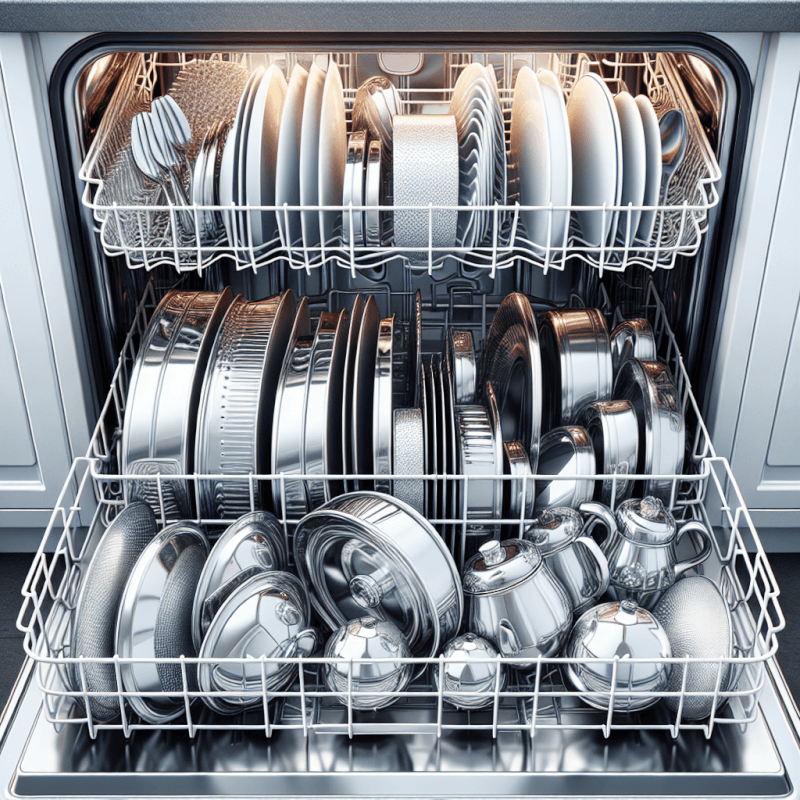You’ll never have to worry about the hassle of handwashing your bakeware again with our incredible line of Bakeware Dishwasher Safe products. Keeping your kitchen clean and organized has never been easier, as our bakeware is designed to withstand the high temperatures and powerful water jets of your dishwasher, while still maintaining its quality and longevity. Say goodbye to scrubbing and scrubbing, and say hello to hassle-free baking with Bakeware Dishwasher Safe.

What is Bakeware Dishwasher Safe?
Definition of Bakeware Dishwasher Safe
Bakeware dishwasher safe refers to baking pans, molds, and trays that are specifically designed and manufactured to be safely cleaned in a dishwasher. These types of bakeware are made with materials and coatings that can withstand the heat, water, and detergent used in dishwasher cycles without getting damaged or losing their quality.
Importance of Bakeware Dishwasher Safe
Having bakeware that is dishwasher safe is crucial for modern-day home cooks and baking enthusiasts. It not only saves time and effort but also ensures convenience and hygiene in the kitchen. Bakeware that is dishwasher safe offers several advantages, including easy cleaning, durability, and versatility. Additionally, it promotes food safety and helps preserve the quality of the bakeware over time.
Types of Bakeware Dishwasher Safe
1. Nonstick Bakeware
Nonstick bakeware is extremely popular among home cooks and professional bakers. This type of bakeware is coated with a layer of nonstick material, usually Teflon or ceramic, which prevents food from sticking to the surface. Nonstick bakeware is also dishwasher safe, making it easy to clean and maintain.
2. Ceramic Bakeware
Ceramic bakeware is known for its even heat distribution and attractive presentation. It is generally safe to use in the dishwasher, but it’s important to check the manufacturer’s instructions to ensure compatibility. Some ceramic bakeware may have delicate or hand-painted designs that require hand washing.
3. Glass Bakeware
Glass bakeware is a classic choice that is oven-safe and dishwasher safe. It is highly versatile and can withstand high temperatures without warping or cracking. Glass bakeware is also non-reactive, which means it won’t absorb odors or flavors and won’t affect the taste of your baked goods.
4. Silicone Bakeware
Silicone bakeware is flexible, non-stick, and easy to clean. It is safe to use in the dishwasher, making it a convenient option for those who prefer to avoid hand washing. Silicone bakeware is also lightweight and easy to store, making it a popular choice for small kitchens.
5. Stainless Steel Bakeware
Stainless steel bakeware is known for its durability and heat conductivity. It is generally dishwasher safe, although some stainless steel pans may develop water spots or discoloration over time. To maintain the appearance of stainless steel bakeware, it is recommended to dry it immediately after washing.
6. Cast Iron Bakeware
Cast iron bakeware, such as skillet pans and Dutch ovens, is renowned for its heat retention and even heating properties. While cast iron is not typically recommended for dishwashers, some manufacturers produce enameled cast iron bakeware that is safe for dishwasher use. However, it is important to carefully follow the manufacturer’s instructions to avoid damaging the enamel coating.
7. Aluminum Bakeware
Aluminum bakeware is lightweight, durable, and known for its excellent heat distribution. Most aluminum bakeware is dishwasher safe, but it is always advisable to read the manufacturer’s recommendations to ensure proper care and maintenance. In some cases, hand washing may be recommended for specific aluminum bakeware.
8. Enamel Coated Bakeware
Enamel-coated bakeware combines the durability of metal with the non-reactive properties of enamel. It is generally safe to clean enamel-coated bakeware in the dishwasher, but it’s important to follow the manufacturer’s guidelines to avoid chipping or damaging the enamel coating.
9. Copper Bakeware
Copper bakeware provides superior heat conductivity and precise temperature control. While copper pans are not typically dishwasher safe due to the potential for discoloration, some manufacturers produce copper bakeware with a protective coating that allows for dishwasher use. Always check the manufacturer’s instructions to maintain the quality and appearance of copper bakeware.
10. Carbon Steel Bakeware
Carbon steel bakeware is known for its durability and ability to develop a natural nonstick surface over time. While carbon steel pans are not typically dishwasher safe, some carbon steel bakeware may be specifically designed to withstand dishwasher use. It is important to carefully read the manufacturer’s recommendations to ensure proper care.

Benefits of Using Bakeware Dishwasher Safe
1. Time-saving
Using dishwasher-safe bakeware significantly reduces the time and effort required for cleaning. Instead of spending valuable time scrubbing and scrubbing by hand, you can simply place the bakeware in the dishwasher and let it do the work for you. This allows you to focus on other aspects of cooking and baking, making your kitchen routines more efficient.
2. Convenience
Dishwasher-safe bakeware offers a level of convenience that cannot be overstated. Instead of manually washing and drying each individual piece of bakeware, you can easily load them into the dishwasher, press a few buttons, and walk away. This convenience is particularly beneficial for those with busy lifestyles or limited time in the kitchen.
3. Hygiene
Properly cleaning bakeware is essential for maintaining a hygienic kitchen. Dishwashers use high temperatures and powerful detergents, effectively sanitizing the bakeware and killing bacteria and germs. By using dishwasher-safe bakeware, you ensure that your baking tools are thoroughly cleaned and safe to use for the preparation of your favorite dishes.
4. Durability
Bakeware that is dishwasher safe is specifically designed to withstand the rigors of dishwasher cycles. The materials and coatings used in these products are chosen for their durability and resistance to heat, water, and detergents. By using dishwasher-safe bakeware, you can extend the lifespan of your baking tools and ensure they remain in excellent condition for longer periods.
5. Easy Cleaning
One of the biggest advantages of using dishwasher-safe bakeware is the ease of cleaning. With a few simple steps, you can remove grease, food residues, and stains from your bakeware without any scrubbing or soaking. This not only saves time and effort but also eliminates the need for harsh chemical cleaners that may damage the surfaces of your bakeware.
6. Versatility
Dishwasher-safe bakeware is available in a wide range of sizes, shapes, and materials, making it suitable for various baking needs. From cake pans to cookie sheets, you can find dishwasher-safe options for almost any type of recipe. This versatility allows you to explore different baking techniques and experiment with new recipes without worrying about the cleaning process.
7. Food Safety
Using dishwasher-safe bakeware helps maintain food safety standards in your kitchen. The high temperatures and sanitizing properties of dishwashers effectively eliminate bacteria, germs, and food residues that can contaminate your bakeware. This ensures that your baked goods are prepared in a clean and safe environment, reducing the risk of foodborne illnesses.
8. Cost-effective
Investing in dishwasher-safe bakeware can be cost-effective in the long run. These products are designed to withstand multiple uses and dishwasher cycles without losing their quality or functionality. By choosing dishwasher-safe bakeware, you reduce the need for frequent replacements and save money on purchasing new baking tools.
9. Preserves Bakeware Quality
Bakeware that is not dishwasher safe may be susceptible to damage when exposed to high heat, water, and detergents. By using dishwasher-safe bakeware, you can protect the quality and integrity of your baking tools. This means that your bakeware will retain its shape, performance, and appearance over time, allowing you to enjoy consistent and reliable baking results.
10. Eco-friendly
Using dishwasher-safe bakeware is an eco-friendly choice. By opting for dishwasher cleaning instead of hand washing, you conserve water and reduce the use of harmful cleaning products. Additionally, dishwasher cycles are designed to be energy efficient, minimizing the environmental impact of cleaning your bakeware.
Factors to Consider When Choosing Bakeware Dishwasher Safe
1. Material
The material of your bakeware plays a crucial role in determining its dishwasher compatibility. While many types of bakeware are dishwasher safe, there may be variations within each material category. It’s important to consult the manufacturer’s instructions and guidelines to ensure that your chosen bakeware material is suitable for dishwasher use.
2. Quality
Choosing high-quality bakeware is essential for optimal dishwasher performance and longevity. Lower-quality or poorly constructed bakeware may not withstand the heat, pressure, and detergents used in dishwasher cycles, leading to warping, discoloration, or damage. Look for reputable brands and read user reviews to gauge the quality and durability of the bakeware.
3. Size and Shape
Consider the size and shape of the bakeware when evaluating dishwasher compatibility. Some dishwashers may have size limitations or specific rack configurations that can limit the size and shape of bakeware that can be accommodated. Ensure that your chosen bakeware fits comfortably in your dishwasher without impeding the spray arm or obstructing other items.
4. Dishwasher Compatibility
Not all dishwashers are created equal, and the compatibility between your bakeware and the dishwasher is crucial. Factors such as water temperature, detergent strength, and cycle duration may vary between different dishwasher models. It’s important to check the manufacturer’s instructions for both the bakeware and dishwasher to ensure compatibility and avoid potential damage.
5. Manufacturer Guidelines
Always refer to the manufacturer’s instructions and guidelines when determining whether bakeware is dishwasher safe. Manufacturers have tested their products for compatibility with specific dishwasher models and cycles, and they provide valuable information regarding proper care and maintenance. Following these guidelines will help ensure the longevity and quality of your bakeware.
6. User Reviews
User reviews can provide valuable insights into the dishwasher performance of specific bakeware products. Real-life experiences and feedback from other users can give you an idea of how well a particular brand or model holds up in the dishwasher. Consider reading reviews from trusted sources or online platforms dedicated to kitchen products and appliances.
7. Price
Price is an important consideration when choosing dishwasher-safe bakeware. While cost doesn’t always indicate quality, it’s essential to find a balance between affordability and durability. Consider your budget and prioritize features that are important to you, such as material, brand reputation, and customer reviews.
8. Warranty
Look for bakeware that comes with a warranty or guarantee. A warranty can provide peace of mind, assuring you that the manufacturer stands behind the quality and performance of their product. Be sure to read the terms and conditions of the warranty to fully understand what is covered and for how long.

How to Properly Care for Bakeware Dishwasher Safe
1. Follow Manufacturer Instructions
The most important step in caring for dishwasher-safe bakeware is to follow the manufacturer’s instructions. Each brand and type of bakeware may have specific care requirements that are crucial for maintaining its quality and dishwasher compatibility. Read the user manual or packaging carefully and adhere to the recommended cleaning and maintenance guidelines.
2. Pre-wash Before Dishwasher
Pre-washing your bakeware before placing it in the dishwasher can help remove excess grease, food residues, and other debris. Use a non-abrasive sponge or brush and mild detergent to gently scrub away any stubborn stains or build-up. This pre-washing step ensures that the dishwasher can effectively clean your bakeware without any blockages or clogs.
3. Use Suitable Dishwashing Cycle
Select the appropriate dishwasher cycle for your bakeware. Most dishwashers offer different options, such as “normal,” “heavy-duty,” or “pots and pans.” Choose a cycle that is suitable for the level of dirt and grease on your bakeware. Avoid using delicate or quick cycles for heavily soiled bakeware, as this may not provide thorough cleaning.
4. Avoid Overloading the Dishwasher
Avoid overloading the dishwasher with too many pieces of bakeware. Overcrowding the dishwasher can lead to inadequate cleaning and may prevent proper water flow and detergent distribution. Give your bakeware enough space to allow the spray arms to reach all surfaces, ensuring thorough cleaning and optimal performance.
5. Avoid Abrasive Cleaning Tools
When cleaning dishwasher-safe bakeware, avoid using abrasive cleaning tools, such as steel wool or harsh scouring pads. These tools can scratch or damage the surfaces and coatings of the bakeware, compromising its nonstick properties and overall quality. Instead, opt for non-abrasive sponges or brushes that are safe for the specific material of your bakeware.
6. Allow Bakeware to Cool Down
Allow your bakeware to cool down after removing it from the oven before placing it in the dishwasher. Rapid temperature changes can cause thermal shock and potentially damage the bakeware. Give it some time to cool naturally to room temperature, or run it under cool water before transferring it to the dishwasher.
7. Store Properly
Proper storage of your bakeware is essential for maintaining its quality and longevity. After cleaning, ensure that your bakeware is completely dry before storing it in a cool, dry place. Moisture or condensation can lead to mold or corrosion, especially for certain types of materials. Consider using protective covers or placing a sheet of parchment paper between stacked items to prevent scratching or damage.
Common Dishwasher-Safe Bakeware Myths Debunked
1. Dishwasher Harms Bakeware
This is a common misconception that dishwashers can harm bakeware. In reality, dishwasher-safe bakeware is designed and tested to withstand dishwasher cycles without any adverse effects on its quality or performance. It is important to choose bakeware that is specifically labeled as dishwasher safe and follow the manufacturer’s instructions for proper care.
2. Nonstick Coating is Damaged by Dishwasher
Most nonstick coatings on dishwasher-safe bakeware are designed to be resistant to the high temperatures and detergents used in dishwasher cycles. However, excessive exposure to high temperatures or using abrasive cleaning tools can damage the nonstick coating over time. It is important to follow the manufacturer’s instructions and avoid harsh cleaning methods to preserve the nonstick properties of your bakeware.
3. Dishwashers Cause Discoloration
While some materials, such as copper or stainless steel, may develop minor discoloration after repeated dishwasher use, this does not necessarily indicate damage. Discoloration can be caused by mineral deposits or reactions between the metal and dishwasher detergents. In most cases, these cosmetic changes do not affect the functionality or safety of the bakeware.
4. Dishwashers are Not Suitable for Delicate Bakeware
While it’s true that delicate or hand-painted bakeware may require special care, many dishwasher-safe bakeware options can accommodate delicate items. It is important to check the manufacturer’s instructions for specific guidelines. Some delicate bakeware may be able to be safely placed in the dishwasher, while others may require gentle hand washing to preserve their decorative elements.

Alternatives to Dishwasher for Cleaning Bakeware
1. Hand Washing
Hand washing is a traditional and effective method for cleaning bakeware. Using warm water, mild detergent, and a non-abrasive sponge or brush, you can gently scrub away any food residues or stains. This method allows for more control and attention to detail, particularly for delicate or intricate bakeware.
2. Soaking and Scrubbing
For tough stains or baked-on residues, soaking bakeware in warm, soapy water can help loosen the debris. After soaking for a sufficient amount of time, use a sponge or brush to gently scrub away the remaining stains. This method is particularly effective for removing stubborn grease or burnt food particles.
3. Baking Soda and Vinegar
Baking soda and vinegar are natural cleaning agents that can be used to tackle tough stains and odors on bakeware. Create a thick paste by mixing baking soda with water, apply it to the stained areas, and let it sit for a few hours. Then, scrub the bakeware with a sponge or brush dipped in vinegar to remove the residue and neutralize any odors.
4. Lemon Juice
Lemon juice is a natural acid that can be used to remove stains and brighten bakeware. Squeeze fresh lemon juice onto the stained areas and let it sit for a few minutes. Then, scrub the bakeware with a sponge or brush to lift the stains. Rinse thoroughly with water to remove any lemon residue.
5. Hydrogen Peroxide
Hydrogen peroxide is a powerful cleaning agent that can be used to remove stubborn stains and discoloration from bakeware. Pour a small amount of hydrogen peroxide directly onto the stained areas and let it sit for a few minutes. Then, scrub the bakeware with a sponge or brush and rinse thoroughly with water.
6. Salt and Lime
Salt and lime can be combined to create a natural abrasive cleaner for bakeware. Cut a lime in half, dip the cut side in salt, and use it to scrub the stained areas of the bakeware. The combination of salt and the acidity of the lime helps remove grime and lift tough stains. Rinse thoroughly with water to remove any salt or lime residue.
Common Mistakes to Avoid When Using Dishwasher for Bakeware
1. Dishwasher Temperature Settings
Using excessively high temperature settings on your dishwasher can cause damage to certain types of bakeware. Check the manufacturer’s instructions for recommended temperature ranges and adjust the dishwasher settings accordingly.
2. Improper Loading
Improperly loading the dishwasher can prevent proper water circulation and lead to inadequate cleaning. Avoid overcrowding the dishwasher and ensure that each piece of bakeware has enough space for water and detergent to reach all surfaces.
3. Harsh Detergents
Using harsh or abrasive dishwasher detergents can damage the surfaces and coatings of bakeware. Opt for mild and dishwasher-safe detergents that are specifically formulated for use with cookware and bakeware. This will help preserve the quality and appearance of your bakeware over time.
4. Leaving Food Residues
Leaving food residues on the bakeware before placing it in the dishwasher can lead to clogs and inadequate cleaning. Always pre-wash or scrape off excess food residues from your bakeware to ensure thorough cleaning in the dishwasher.
5. Not Using Rinse Aid
Rinse aid is an important component of dishwasher cycles as it helps prevent water spots and aids in the drying process. Using rinse aid in your dishwasher can ensure that your bakeware comes out of the dishwasher clean and streak-free.
6. Neglecting Maintenance
Proper maintenance is essential for the longevity and performance of dishwasher-safe bakeware. Regularly inspect your bakeware for any signs of damage or wear and tear. Replace any damaged or worn-out bakeware to ensure optimal results.

Frequently Asked Questions (FAQs) About Bakeware Dishwasher Safe
1. Can all types of bakeware be used in the dishwasher?
Not all types of bakeware can be safely cleaned in the dishwasher. While many materials, such as glass, silicone, and stainless steel, are generally dishwasher safe, it is important to check the manufacturer’s instructions for specific guidelines. Delicate or hand-painted bakeware may require hand washing to preserve their decorative elements.
2. Are there any bakeware materials that should not be put in the dishwasher?
Certain materials, such as copper or nonstick coatings, may not be suitable for dishwasher use. Copper bakeware may develop discoloration or react with dishwasher detergents, while nonstick coatings can deteriorate over time if subjected to harsh dishwasher cycles. Always check the manufacturer’s instructions for specific care recommendations.
3. How often should bakeware be cleaned in the dishwasher?
The frequency of cleaning bakeware in the dishwasher depends on individual usage and preferences. Ideally, bakeware should be cleaned after each use to prevent the buildup of grease, food residues, and stains. Regular cleaning ensures that your bakeware remains in good condition and ready for future baking endeavors.
4. Can dishwashers damage the nonstick coating on bakeware?
While dishwashers with harsh cycles or high temperatures can potentially damage nonstick coatings, dishwasher-safe bakeware is designed to withstand dishwasher use. However, it is important to follow the manufacturer’s instructions and use mild detergents to preserve the nonstick properties of the bakeware.
5. Is it safe to wash bakeware with other dishes in the dishwasher?
It is generally safe to wash bakeware with other dishes in the dishwasher. However, be mindful of overcrowding the dishwasher and ensure that each item has enough space for proper water circulation. Avoid stacking heavy items on top of delicate bakeware to prevent damage or breakage.
6. Can dishwashers remove baked-on stains and residues from bakeware?
Dishwashers are designed to remove grease, food residues, and stains from bakeware. However, heavily soiled or baked-on residues may require pre-washing or soaking before placing the bakeware in the dishwasher. For stubborn stains, alternative cleaning methods such as baking soda or lemon juice may be more effective.
7. How should I dry my bakeware after washing it in the dishwasher?
After removing bakeware from the dishwasher, it is important to allow it to air dry completely. Placing wet bakeware in a closed cabinet or storing it before it is fully dry can promote the growth of mold or unpleasant odors. Ensure that the bakeware is completely dry before storing it in a cool, dry place.
Conclusion
In conclusion, having bakeware that is dishwasher safe is a valuable asset in any kitchen. It offers numerous benefits such as time-saving, convenience, hygiene, and durability. By choosing the right type of bakeware that is compatible with dishwashers, you can enjoy easy cleaning, preserve the quality of your baking tools, and promote food safety. Remember to consider factors such as material, quality, dishwasher compatibility, and manufacturer guidelines when selecting dishwasher-safe bakeware. Proper care and maintenance, including pre-washing, suitable dishwasher cycles, and avoiding common mistakes, will help you maximize the lifespan and performance of your bakeware. If you prefer alternative cleaning methods, options such as hand washing, soaking, or using natural cleaning agents can also effectively clean your bakeware. By debunking common myths and addressing frequently asked questions, this comprehensive article aims to provide the necessary information to make informed decisions and enhance your baking experience.


